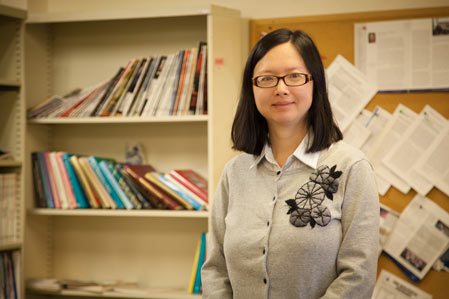Cheung Named Fellow of American Physical Society
 Working toward new therapies to target cancer and Alzheimer’s, University of Houston
(UH) physicist Margaret Cheung strives to understand the physics that govern how ordinary
matter becomes life-like. Cheung was recently named a fellow of the American Physical
Society (APS). Her award was presented March 4 at the annual meeting of the APS Division
of Biological Physics in Denver.
Working toward new therapies to target cancer and Alzheimer’s, University of Houston
(UH) physicist Margaret Cheung strives to understand the physics that govern how ordinary
matter becomes life-like. Cheung was recently named a fellow of the American Physical
Society (APS). Her award was presented March 4 at the annual meeting of the APS Division
of Biological Physics in Denver.
“If we can understand how life functions at a molecular level in the clutter of a cellular environment, then we can use this knowledge for drug design to intercept pathways of biological processes inside cells at a nano level before symptoms develop,” Cheung said. “Understanding the structures and enzymatic activity of proteins inside a cell is important to shed light on preventing, managing or curing certain diseases at a molecular level.”
Cheung, an associate professor of physics in the UH College of Natural Sciences and Mathematics, has been performing research in the field of biophysics since 1997, studying the behavior of biological molecules in cells. Honoring her years of hard work and dedication, the APS citation commends her for contributions to modeling and simulations necessary to achieve a comprehensive understanding of the folding, structure and function of protein in a cellular environment.
Her research examines the travels of proteins and how their actions inside a cell may impact the development of disease. To do this, she uses computer simulations and physics modeling, as well as collaborates with experimentalists in the Texas Medical Center to probe, detect and predict the behavior of these proteins.
“When strategies to manipulate signaling proteins become available, there is hope in being able to control cell growth and cell death by appropriately disordering the cellular environment, thereby directing the activation or suppression of certain signaling pathways,” Cheung said. “This is important to making advances in novel therapeutic strategies associated with the uncontrolled growth and spread of abnormal cells, such as those found in cancer and Alzheimer’s.”
Fascinated by how things work since childhood, Cheung knew by the age of 15 that she wanted to be a scientist and says that physics is a wonderful tool to understand such concepts. Cheung decided to join UH in 2006, saying that the physics department was just starting to become involved in new research areas, such as biological research. Additionally, she says, the resources in the Houston area, such as the Texas Medical Center, make UH a great environment for innovative research.
Once at UH, Cheung started a research and education program in theoretical biological physics and soft matter. She says this knowledge will impact disease-related research, enabling scientists to detect how symptoms develop at an early stage, using computer simulations and modeling to try to understand and predict the behavior of diseases inside a cell under both normal and disease conditions.
“It is entirely appropriate that Margaret Cheung’s highly creative research be recognized through the APS fellowship program,” said Gemunu Gunaratne, chair of UH’s Department of Physics. “She is not only a superb scientist, but also performs her other duties diligently. She participates in developing new approaches for undergraduate education and is an active member of several departmental committees. She also impacts physics education in local schools as the principal investigator of a program funded by the Texas Higher Education Coordinating Board to introduce new teaching tools to Houston-area high school teachers.”
The APS has more than 50,000 members, including physicists in academia, national laboratories and industry in the U.S. and throughout the world. APS fellows are selected for their exceptional contributions to physics, and election is limited to no more than one half of one percent of the membership. Cheung’s nomination was recommended by the APS Division of Biological Physics, which is composed of individuals who are interested in the study of biological phenomena using physical techniques.
- Lisa Merkl, University Communication